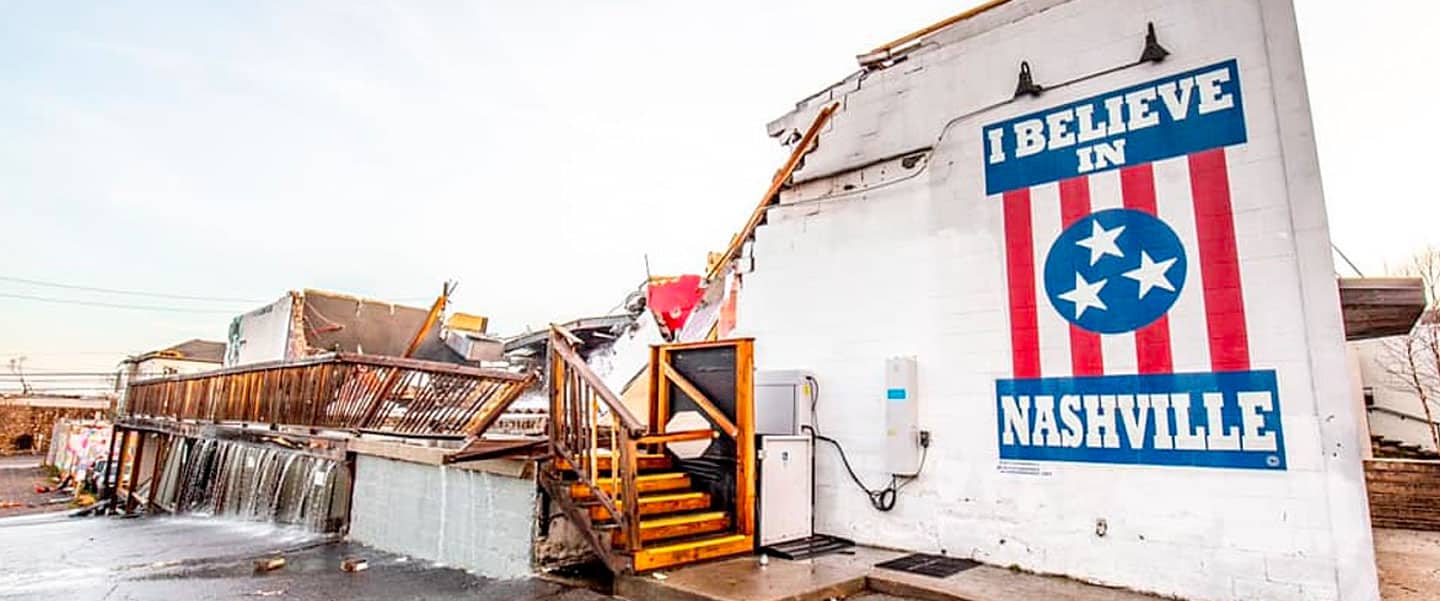CATEGORIES:
In Nashville, Tornado Season Could Be Any Day of the Year
March 5, 2020

Yes, tornadoes, like hurricanes and many other natural phenomena, do technically have a "season." In the United States, tornado season generally falls in the spring, during the months of April, May, and June. Higher numbers of tornadoes form in these months compared to other times of the year. Tornadoes are often more intense during these months as well.
Although there are more tornadoes in the spring compared to the other seasons, that doesn’t mean that other seasons are tornado-free. In fact, tornadoes can strike on any day of the year.
Sadly, this truth was on vivid display during the first week of March 2020.
Deadly Tornadoes Strike Tennessee
Starting just before midnight on March 2nd, and extending into the early hours of March 3rd, a series of tornadoes struck central Tennessee. The worst one was an EF4 in intensity, meaning that it had winds that exceeded 165 miles per hour.
This was declared the deadliest tornado event in seven years, even before authorities were finished assessing the full extent of the damages. (Not since the EF5 tornado that hit Moore, Oklahoma in 2013 had a tornado brought such fatal destruction.)
Multiple counties in Tennessee experienced fatalities, including Putnam, Wilson, Benton, and Davidson (which is home to the city of Nashville). Putnam County was the hardest-hit, enduring 18 fatalities. These tornadoes that hit Tennessee were part of a larger onslaught, as tornadoes also touched down in communities in Kentucky, Missouri, and Alabama.
Two days after this severe weather event, at least 24 people had been declared dead. As a result of the storms, tens of thousands of residents lost power, and hundreds of buildings got destroyed, including people’s homes. The tornadoes even adversely affected Super Tuesday voting at some polling places in Tennessee.
Condolences and Gratitude in Trying Times
Obviously, the death toll in Tennessee is profoundly troubling, and we at Survive-A-Storm extend our deepest sympathies to the families and communities affected by this horrible tragedy. We also express our gratitude to law enforcement, firefighters, and other first responders, as well as (extra)ordinary citizens who rushed in to help their neighbors in need.
But in the face of such devastation, the path forward, after mourning and recovery, needs to include preparation. The sobering truth is that tornadoes will strike other communities in the United States. And the heart of “tornado season,” that is, April-June, hasn’t even arrived yet.
Tornadoes Don’t Just Arise in a Few Places
Not confined by time or space, tornadoes can, and have, hit all 50 states. Roughly 1,200 tornadoes strike the United States each year. No place in the country is fully immune to these terrible storms, though certain regions are more prone to them than others.
Many Americans are likely familiar with the term “Tornado Alley,” which describes an area overlapping the Great Plains and is traditionally associated with deadly twisters. Though not strictly defined, Tornado Alley usually denotes northern Texas, Oklahoma, Kansas, Nebraska, South Dakota, and North Dakota, as well as portions of their neighbors, Iowa, Minnesota, Colorado, and Missouri.
Less well-known is “Dixie Alley” which covers much of Georgia, Alabama, Mississippi, Louisiana, Arkansas, Tennessee, and portions of their bordering states. Though not as commonly discussed as its cousin to the north and west, this “Alley” often experiences tornadoes that are even deadlier. Sadly, the March 2020 tornadoes fit right into this model.
Planning for Potential Tornadoes
We can’t simply prevent tornadoes, but there are steps we can take as defensive measures. Here is a list of essential things to remember when thinking about how best to protect yourself and your family from severe weather.
Identify a safe space
As we have discussed before, being on the road is not a good place to be during severe weather. Whether you’re in a vehicle or walking, you are at great risk if you are out in the open when a tornado hits. Two of the fatalities from the March 2020 Tennessee tornadoes were killed by flying debris on a street in Nashville.
Ideally, your home would have a dedicated storm shelter, designed and built specifically for the purpose of protecting you and your family from deadly tornadoes. At the very least, you should be able to take refuge in a basement or in a safe room that has no windows or exterior walls. It’s best to put as many sturdy barriers between you and the tornado as possible.
Have an established plan
According to Davidson County authorities, residents of East Nashville only had six minutes to find safety from the storm after being warned. As these storms occurred late at night and into the early morning, they caught many people sleeping. Could you wake up your whole family and get them to your storm shelter in such a short amount of time? Planning for the worst now may just produce the best possible outcome in the future.
Make sure you can stay updated
Most Americans depend heavily on devices and other modern conveniences. But tens of thousands of residents in these tornado-stricken areas lost power during or after the storms hit. If there was no electricity, and you couldn’t get cell phone reception, how would you hear the latest storm-related news? It’s best to have a radio and a flashlight powered by batteries or by a hand crank that won’t fail if the utilities or the cell network goes out.
In Conclusion
Tornadoes can strike any time of the day, potentially on any day of the year. No part of the United States is completely safe. And sadly, tornadoes often bring deadly destruction with them. But there are steps that you and your family can take to better ensure your safety.
Have a safe space, share your well-developed plan with your family, and prepare for how you will stay informed.
Reach Out to Survive-A-Storm
Unfortunately, we can’t prevent tornadoes from happening altogether. But by taking precautionary steps, we can minimize their tragic effects.
If you would like to learn more about how you can protect your family from severe weather, contact Survive-A-Storm today. Whether you’re an individual or a business (of any size), we can find a storm shelter that will suit your needs.



